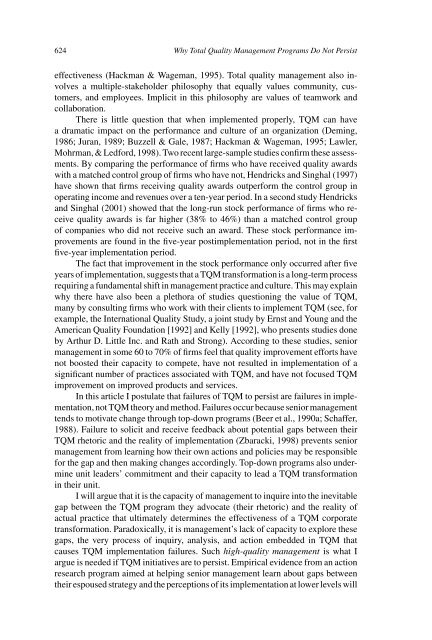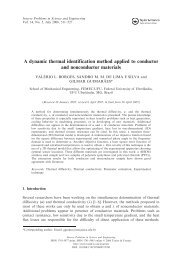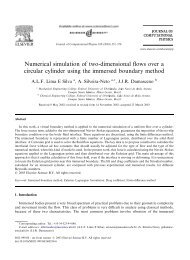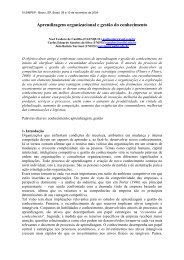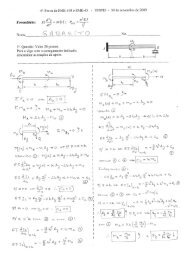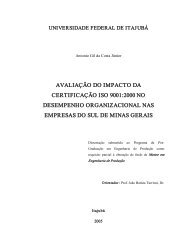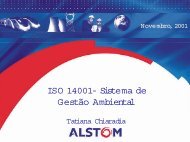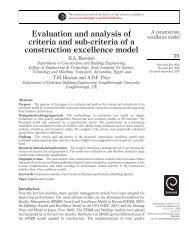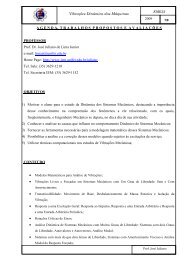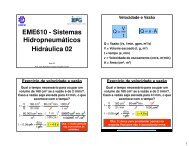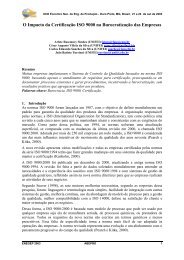Why Total Quality Management Programs Do Not Persist: The ... - IEM
Why Total Quality Management Programs Do Not Persist: The ... - IEM
Why Total Quality Management Programs Do Not Persist: The ... - IEM
Create successful ePaper yourself
Turn your PDF publications into a flip-book with our unique Google optimized e-Paper software.
624 <strong>Why</strong> <strong>Total</strong> <strong>Quality</strong> <strong>Management</strong> <strong>Programs</strong> <strong>Do</strong> <strong>Not</strong> <strong>Persist</strong><br />
effectiveness (Hackman & Wageman, 1995). <strong>Total</strong> quality management also involves<br />
a multiple-stakeholder philosophy that equally values community, customers,<br />
and employees. Implicit in this philosophy are values of teamwork and<br />
collaboration.<br />
<strong>The</strong>re is little question that when implemented properly, TQM can have<br />
a dramatic impact on the performance and culture of an organization (Deming,<br />
1986; Juran, 1989; Buzzell & Gale, 1987; Hackman & Wageman, 1995; Lawler,<br />
Mohrman, & Ledford, 1998). Two recent large-sample studies confirm these assessments.<br />
By comparing the performance of firms who have received quality awards<br />
with a matched control group of firms who have not, Hendricks and Singhal (1997)<br />
have shown that firms receiving quality awards outperform the control group in<br />
operating income and revenues over a ten-year period. In a second study Hendricks<br />
and Singhal (2001) showed that the long-run stock performance of firms who receive<br />
quality awards is far higher (38% to 46%) than a matched control group<br />
of companies who did not receive such an award. <strong>The</strong>se stock performance improvements<br />
are found in the five-year postimplementation period, not in the first<br />
five-year implementation period.<br />
<strong>The</strong> fact that improvement in the stock performance only occurred after five<br />
years of implementation, suggests that a TQM transformation is a long-term process<br />
requiring a fundamental shift in management practice and culture. This may explain<br />
why there have also been a plethora of studies questioning the value of TQM,<br />
many by consulting firms who work with their clients to implement TQM (see, for<br />
example, the International <strong>Quality</strong> Study, a joint study by Ernst and Young and the<br />
American <strong>Quality</strong> Foundation [1992] and Kelly [1992], who presents studies done<br />
by Arthur D. Little Inc. and Rath and Strong). According to these studies, senior<br />
management in some 60 to 70% of firms feel that quality improvement efforts have<br />
not boosted their capacity to compete, have not resulted in implementation of a<br />
significant number of practices associated with TQM, and have not focused TQM<br />
improvement on improved products and services.<br />
In this article I postulate that failures of TQM to persist are failures in implementation,<br />
not TQM theory and method. Failures occur because senior management<br />
tends to motivate change through top-down programs (Beer et al., 1990a; Schaffer,<br />
1988). Failure to solicit and receive feedback about potential gaps between their<br />
TQM rhetoric and the reality of implementation (Zbaracki, 1998) prevents senior<br />
management from learning how their own actions and policies may be responsible<br />
for the gap and then making changes accordingly. Top-down programs also undermine<br />
unit leaders’ commitment and their capacity to lead a TQM transformation<br />
in their unit.<br />
I will argue that it is the capacity of management to inquire into the inevitable<br />
gap between the TQM program they advocate (their rhetoric) and the reality of<br />
actual practice that ultimately determines the effectiveness of a TQM corporate<br />
transformation. Paradoxically, it is management’s lack of capacity to explore these<br />
gaps, the very process of inquiry, analysis, and action embedded in TQM that<br />
causes TQM implementation failures. Such high-quality management is what I<br />
argue is needed if TQM initiatives are to persist. Empirical evidence from an action<br />
research program aimed at helping senior management learn about gaps between<br />
their espoused strategy and the perceptions of its implementation at lower levels will


